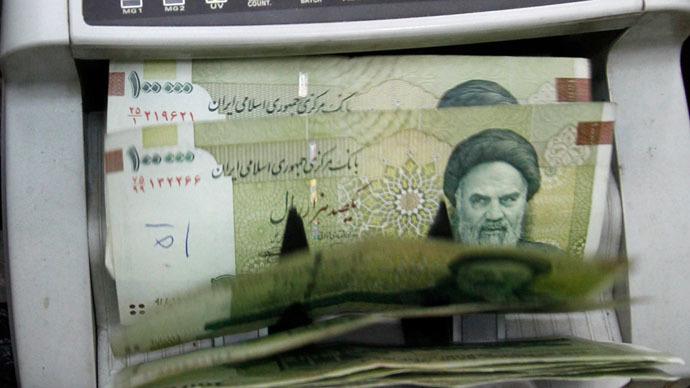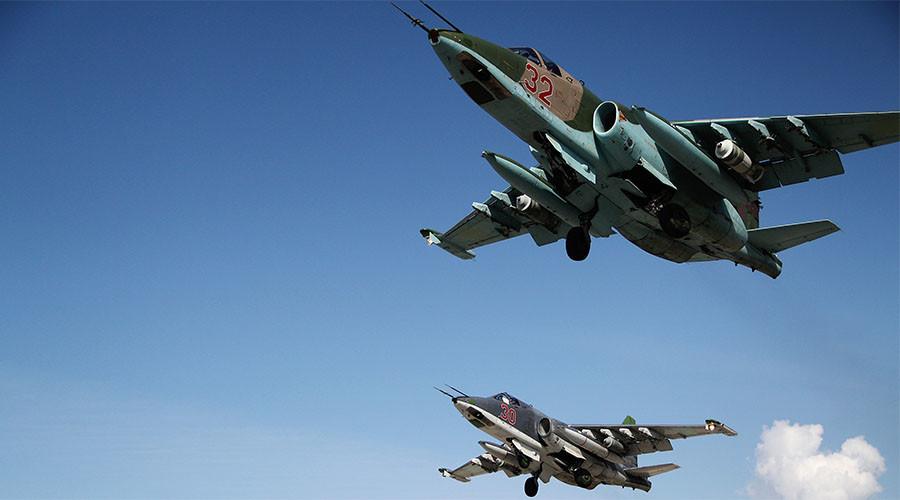Α)Ο χάρτης των ρωσικών βομβαρδισμών στη Συρία



Επίθεση σε φάλαγγα
Σύμφωνα με το Συριακό Παρατηρητήριο Ανθρωπίνων Δικαιωμάτων,αεροσκάφη βομβάρδισαν φάλαγγα 16 οχημάτων που είχε αναχωρήσει από τη Ράκα και κατευθυνόταν προς την επαρχία Χάμα.
Το Παρατηρητήριο, δεν έχει προσδιορίσει την προέλευση των αεροσκαφών που πραγματοποίησαν την επιδρομή.
Ο επικεφαλής του Παρατηρητηρίου Ραμί Αμπντελραχμάν διαβεβαίωσε ότι δεν ανήκαν στον υπό τις ΗΠΑ διεθνή συνασπισμό κατά του Ι.Κ., στον οποίο συμμετέχουν περισσότερες από 30 χώρες.
Απανθρακωμένα πτώματα τζιχαντιστών κείτονται στον τόπο της επιδρομής, πρόσθεσε.
http://www.onalert.gr

Τι
έχουν βομβαρδίσει οι Ρώσοι από τις 30 Σεπτεμβρίου ως και τις 16
Οκτωβρίου στη Συρία ,αποτυπωνεται στον χάρτη. Με μια ματιά μπορείτε να
διαπιστώσετε ποιοι ήταν οι στόχοι στους οποίους επιτέθηκαν τα αεροσκάφη
των Ρώσων και τα αποτελέσματά τους. Ο χάρτης προέρχεται από το Institute
for the study of war (ISW).
Το αναφέρουμε γιατί παρατηρούμε ότι η μαζικότητα των βομβαρδισμών επικεντρώνεται σε περιοχές που ελέγχουν οι δυνάμεις οι οποίες μάχονται κατά του Άσαντ . Η Ρωσία δεν αποδέχεται ότι βομβαρδίζει κυρίως αυτούς και λιγότερο τους τζιχαντιστές, όπως την κατηγορεί η Δύση.Το βέβαιο είναι ότι η ρωσική επέμβαση στη Συρία είναι πολύ πιο αποτελεσματικά από αυτή που υποτίθεται
Το αναφέρουμε γιατί παρατηρούμε ότι η μαζικότητα των βομβαρδισμών επικεντρώνεται σε περιοχές που ελέγχουν οι δυνάμεις οι οποίες μάχονται κατά του Άσαντ . Η Ρωσία δεν αποδέχεται ότι βομβαρδίζει κυρίως αυτούς και λιγότερο τους τζιχαντιστές, όπως την κατηγορεί η Δύση.Το βέβαιο είναι ότι η ρωσική επέμβαση στη Συρία είναι πολύ πιο αποτελεσματικά από αυτή που υποτίθεται
ότι έκαναν οι δυτικοί τους τελευταίους μήνες.

Επίθεση σε φάλαγγα
Σύμφωνα με το Συριακό Παρατηρητήριο Ανθρωπίνων Δικαιωμάτων,αεροσκάφη βομβάρδισαν φάλαγγα 16 οχημάτων που είχε αναχωρήσει από τη Ράκα και κατευθυνόταν προς την επαρχία Χάμα.
Το Παρατηρητήριο, δεν έχει προσδιορίσει την προέλευση των αεροσκαφών που πραγματοποίησαν την επιδρομή.
Ο επικεφαλής του Παρατηρητηρίου Ραμί Αμπντελραχμάν διαβεβαίωσε ότι δεν ανήκαν στον υπό τις ΗΠΑ διεθνή συνασπισμό κατά του Ι.Κ., στον οποίο συμμετέχουν περισσότερες από 30 χώρες.
Απανθρακωμένα πτώματα τζιχαντιστών κείτονται στον τόπο της επιδρομής, πρόσθεσε.
http://www.onalert.gr
=============================================
Defeating
Islamic State should take precedence over regime change in Syria, Henry
Kissinger has argued, adding that Russia’s intervention may help
re-establish order in the Middle East that was once entirely dominated
by the US.
“The destruction of ISIS is more urgent than the overthrow of Bashar Assad,” the elderly US statesman, who served as Secretary of State to Presidents Richard Nixon and Gerald Ford, wrote in the Wall Street Journal on Friday. “The current inconclusive U.S. military effort risks serving as a recruitment vehicle for ISIS as having stood up to American might.”
In the commentary, titled ‘A Path Out of the Middle East Collapse,’ Kissinger argues the region is “in shambles” as non-state movements tear apart countries like Libya, Yemen, Syria and Iraq. He calls the so-called Islamic State (IS, also known as ISIS and ISIL) established in parts of Iraq and Syria an “unrelenting foe of established world order,” seeking to replace the international system with an Islamic empire.
Though
the US has dominated the region following the 1973 Arab-Israeli war,
Washington is now at odds with just about every party in the region and
at risk of losing all ability to shape events, Kissinger warned. At
issue in the Middle East today is “American resolve in understanding and
mastering a new world.”
“The destruction of ISIS is more urgent than the overthrow of Bashar Assad,” the elderly US statesman, who served as Secretary of State to Presidents Richard Nixon and Gerald Ford, wrote in the Wall Street Journal on Friday. “The current inconclusive U.S. military effort risks serving as a recruitment vehicle for ISIS as having stood up to American might.”
In the commentary, titled ‘A Path Out of the Middle East Collapse,’ Kissinger argues the region is “in shambles” as non-state movements tear apart countries like Libya, Yemen, Syria and Iraq. He calls the so-called Islamic State (IS, also known as ISIS and ISIL) established in parts of Iraq and Syria an “unrelenting foe of established world order,” seeking to replace the international system with an Islamic empire.
Russia,
he says, merely stepped into a vacuum left by the conflicting and
confused US policies. Moscow’s intervention in Syria is driven by
geopolitical, rather than ideological concerns. Where ideology does come
into play, however, is the conflict between “two rigid and apocalyptic
blocs”: the Shia backed by Iran, and the Sunni states such as Egypt,
Saudi Arabia and Jordan.
According
to Kissinger, Iran is an imperialist power that seeks to extend its
influence by backing the Assad government in Damascus, as well as
non-state actors such as Hezbollah in Lebanon and the Houthis in Yemen.
The Sunni states are pushing to overthrow Assad because they fear
Iranian designs more than those of IS.
Meanwhile, Kissinger argued that the US has antagonized its allies by reaching a nuclear agreement with Iran, “widely interpreted as tacit American acquiescence in Iranian hegemony” in the Sunni Middle East.
The nuclear deal should not be compared to the US-China breakthrough in the early 1970s, he warned: While Washington and Beijing had converging objectives at the time, in particular regarding the Soviet Union, the US and Iran remain fundamentally at odds today.
While
the Russian intervention “serves Iran’s policy of sustaining the Shiite
element in Syria,” Moscow is not committed to indefinitely backing
Assad, Kissinger wrote. In that sense, having the Russians defeat
Islamic State without the need for overt Iranian involvement might offer
a face-saving solution to the Sunni bloc, so long as the liberated
territories are“restored to local Sunni rule.” In this, Kissinger sees a
role for Egypt, Jordan, Turkey and Saudi Arabia.
He suggested federalizing Syria after the defeat of IS, as that “reduces the risks of genocide or chaos leading to terrorist triumph.” Washington should also be ready to have a dialogue with Tehran about Iran “returning to its role as a Westphalian state within its established borders.”
The
key role for the US would be to “implement the military assurances in
the traditional Sunni states that the administration promised during the
debate on the Iranian nuclear agreement,” Kissinger wrote.
Meanwhile, Kissinger argued that the US has antagonized its allies by reaching a nuclear agreement with Iran, “widely interpreted as tacit American acquiescence in Iranian hegemony” in the Sunni Middle East.
The nuclear deal should not be compared to the US-China breakthrough in the early 1970s, he warned: While Washington and Beijing had converging objectives at the time, in particular regarding the Soviet Union, the US and Iran remain fundamentally at odds today.
He suggested federalizing Syria after the defeat of IS, as that “reduces the risks of genocide or chaos leading to terrorist triumph.” Washington should also be ready to have a dialogue with Tehran about Iran “returning to its role as a Westphalian state within its established borders.”
infognomon





Δεν υπάρχουν σχόλια:
Δημοσίευση σχολίου